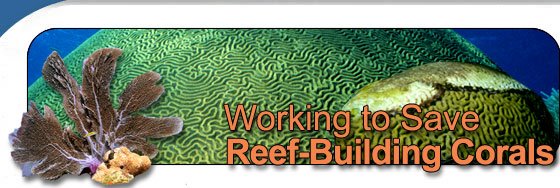Mission Log
Joshua Voss, PhD
Robertson Coral Reef Program
Harbor Branch Oceanographic Institution
Florida Atlantic University
Greetings from the Nancy Foster! Sara Edge and I, both postdoctoral researchers with the Robertson Coral Reef Program at Harbor Branch Oceanographic Institution, are excited to be part of this important expedition. Over the past 7 years my research has focused on coral health and disease, principally on reefs of the Florida Keys and Bahamas. Coral reefs ecosystems in these regions, and indeed worldwide, are under an ongoing and perilous threat from degrading ecosystems and emerging diseases. However, to date little is known regarding the environmental conditions that promote coral infection or the effects of diseases on coral communities. My research experimentally examines coral disease distributions and the environmental factors that potentially drive disease dynamics. In concert with these experimental investigations, large-scale monitoring projects such as the annual FKNMS/ NOAA Coral Disease Cruise provide critical information regarding both the short- and long-term effects of disease on coral community and population structure. Understanding the patterns and mechanisms by which diseases impact corals will facilitate the development of informed, effective management strategies for conserving coral ecosystems.
 |
|
Black band disease (BBD) migrates across a colony of Colpophyllia natans, killing healthy coral tissue near Looe Key
|
I believe that the best science happens when investigators collaborate and take a multidisciplinary approach to research. The Coral Disease Cruise is an excellent example of the quality research that can be accomplished when individuals from governmental, academic, and not-for-profit organizations combine their efforts in a complementary and synthetic approach. For example, during this cruise researchers have not only conducted surveys to expand the ecological coral health database for Florida Keys and Dry Tortugas, but also collected numerous samples of coral diseases and coral mucus for microbial and molecular analyses to be conducted at our various home institutions. My particular interests involve black band disease (BBD), a pathogenic condition found on reefs worldwide. This polymicrobial infection appears as a darkly pigmented mat that migrates across coral colonies, killing coral tissue, and leaving behind bare coral skeleton. The samples we’ve collected during this cruise in the Dry Tortugas and Lower Florida Keys will be compared to samples from the Northern Florida Keys and Bahamas to assess spatial variation in the bacterial assemblages associated with BBD. The combination of ecological monitoring, microbiological, and molecular approaches results in an integrative scheme onboard the Nancy Foster that is not only efficient, but essential for the advancement of coral epidemiology and subsequent efforts toward coral reef conservation.
 |
|
Teams utilized small craft launched from the Nancy Foster to access shallow reef locations. Here the team aboard the NF-2 heads toward Western Sambo. Clockwise from the bow: Kerry Grimshaw, Geoff Cook, Sarah Mrozek, Keith Martin, Joshua Voss, Kathy Morrow. (Photo: Erich Mueller)
|
Throughout our time aboard the Nancy Foster it has become increasingly apparent that we all share a common awe of coral reef ecosystems and intense motivation to protect these valuable resources; and frankly I expected nothing less. With common goals the research teams and crew have worked together with remarkable enthusiasm, stamina, and effectiveness. The welcome surprise has been lively intellectual exchanges, laughter, and genuine comradery amongst the scientists and crew, veterans and first-timers, old and young. My sincere appreciation and thanks to all involved in the 2007 Coral Disease Cruise for making the expedition both successful and entirely too much fun.
|



